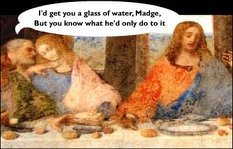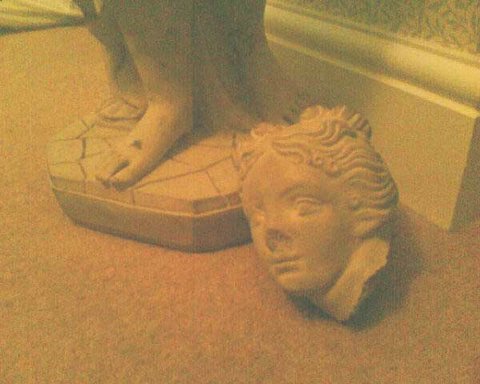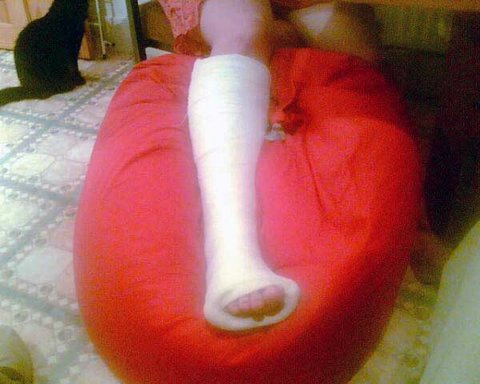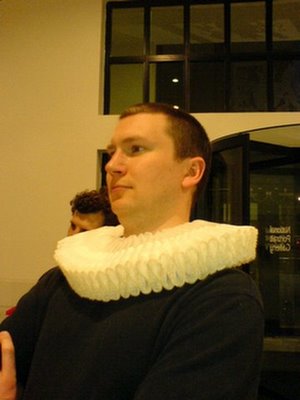"We are unique among nations in our ignorance about our own history," raved Rob Newman last month.
"How curious, for example, that the first world war is never taught in our schools as an invasion of Iraq ... I am sure many of you, like me, have never been entirely satisfied with the standard explanation we were given at secondary school for the causes and origins of the [war] - the assassination of Archduke Ferdinand. I mean, no one is that popular."
Rob Newman, "History of Oil".
Yes, that took me a bit by surprise, too.Now Newman's rant about oil isn't the first thing you'd pair up with AN Wilson, but I've been reading "After the Victorians". Newman, for example, doesn't seem maniacally obsessed with linking everything that happened in the first 50 years of the 20th century to the worries of the Church of England. And he's less reverent of poets and paintings.
Yet both muddle up history and culture since 1900 to show a) that stuff we were taught at school is more interlinked and cross-pollinating than maybe the conventional packaging of history in syllabuses and documentaries makes out, and b) that it very much informs the world we live in now.
Because of that, what are not necessarily new or unspoken-of-previously ideas about the history we take for granted become all the more radical.
Newman goes on to explain the threat posed by the Baghdad-Berlin railway - an extension of the Orient Express from Constantinople down into what was then Persia - in the years leading up to the war. This would give Germany access to Britain's monopoly of oilfields, at a time when Western powers were becoming dependent on oil. Until that point, Germany had no oil reserves of its own. And Wilson agrees:
"If it did not grab the public imagination as a major threat, the railway obsessed the diplomats and politicians. They knew that access to the oilfields of Persia and to India were vital to [British] interests ... In the very debate in the House of Commons after the assassination of the archduke and his wife in Sarajevo, Sir Edward Grey, the foreign secretary, having offered his personal sympathy ... began almost immediately to speak of those things which most concerned British interests in a coming war. He said barely a word about France or Belgium. He used the question of a back-bencher to allow him to revert to oil concessions in Persia and whether two brigades would be enough to protect them."
AN Wilson, "After the Victorians", pp. 135-6.
The first division of British troops deployed in the war was sent, according to Newman, to Basra not Belgium. He argues that we only hear of the war poets from the muddy trenches, though Wilson reminds us that Rupert Brooke fought in Gallipoli, died in Skyros, and wrote to the then Prime Minister's daughter about his classical fancies come alive.Wilson avoids any too obvious linkings of Iraq then and now. He's more interested in India than the oil - the railway affected trade routes as well as black gold, and Wilson's book is most interested in the break up of the territories Empress Victoria had lauded over. That imperial collapse is because of the real victors of the 20th century:
"The USA did well out of the [first world] war. Every country in Europe emerged from the war financially ruined. The United States, however, was immeasurably enriched, not least by European debts owing to various US institutions, to the tune of £2,000 million."
Ibid, p. 202.
He then argues that the collapse of the Empire wasn't just the result of the second world war, but a condition of the US joining the fray. There is an argument (though it's not one Wilson argues) that the world wars were the same war between the old imperial powers, just with a bit of an intermission. Certainly the situation in 1939 can be seen to have come about because of flaws in the 1918 settlements. Still, Wilson's especially damning of our "allies" the US and USSR using the second world war in Europe to further their own horrific expansionist ends.Unlike any war previously, the second world war did not end in peace and order, but a cold war fought between two super-bullies and their affiliated lapdogs. Stalin killed millions, including many who'd been prisoners and/or enemies of the Nazis. But they too suffered an imperial collapse before the end of the century.
The US are even worse than us on their own history. The Dr and I visited the National Air and Space Museum in Dulles while on our honeymoon two years ago. Hanging from the ceiling amid various bi-planes and spacecraft was an innocuous little flyer called Enola Gay. The small plaque gave some idea of the engine capacity, but nothing at all about its famous flight on 6 August 1945, where its one kookily-named bomb killed an estimated 138,890 people - and that not including the after effects.
"The overwhelming view of those who actually knew about the atomic bomb, and its effect upon human lives, was that its use was an obscenity, Niels Bohr, Albert Einstein, Szilard were all utterly opposed. It took tremendous lies, of a Goebbelsesque scale of magnitude, to persuade two or three generations that instead of being gratuitous mass murder, the bombardment of Hiroshima and Nagasaki were almost benign - first, because they avoided the supposed deaths of half a million American troops (the estimated number of casualties had America conquered Japan by an invasion of infantry - a pretext utterly ruled out by the brevity of the time lapse between the dropping of the two weapons); and secondly, because it was better the weapon should be in the hands of the Good Guys rather than truly wicked people such as Hitler or Stalin. Both these views, enlivened with a dash of Bible Christianity, helped to put the President's mind at rest as he meditated upon it all in his diary."
Ibid, pp 472-3.
The implication is that the US dropped the bombs not to have Japan surrender - they'd been attempting to surrender anyhow - but to show Stalin who was boss in the new world order. And they left off many German industralists from facing the noose at Nuremberg because a strong West German economy would be another raspberry blown at Russia."All the just war, good cause, humanitarian arguments, they begin to unravel if ever a war is seen to be part of a continuous foreign policy that has remained absolutely consistent for decades. In the 95 years since Mesopotamian oil was first struck ... Britain has been at war with or occupying Iraq for 45 of them."
Newman, ibid.
Wilson is keen to stress that for all we carpet-bombed German civilians, we were still Better Guys than the Nazis, and life was far better with our "win" than had Hitler succeeded. But we weren't entirely the Good Goys we like to think - and still aren't. The Nazi elite were tried for 'planning and waging an aggressive war' - forcing a brutally consistent strategic and economic agenda in defiance of international laws.Yes, technically we won both wars, but at an incredible cost - financially, politically - and effectively surrendered all our former power and influence to our cousins across the pond. At least we've got the world cup.
Which we won once. Forty years ago.
A period in which the Germans have won it twice, and been runner's up four times.




















